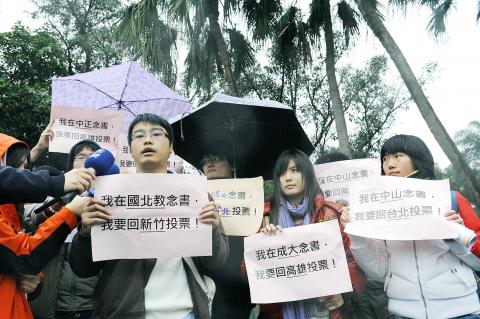Dozens of college students yesterday rallied outside National Taiwan University (NTU), calling on the government to provide assistance with transportation so they can return home to vote on Jan. 14, as election day falls in the final week of exams for many students.
Holding signs showing their school names and their home towns, such as: “I study at NTU, I have to go back to Kaohsiung to vote,” “I study at National Chung Cheng University, I have to go back to Hualien to vote” and “I study at NSYSU [National Sun Yat-sen University], I have to go back to Nantou to vote,” students attending universities that are far away from their hometowns protested outside the main NTU campus in Taipei.
National Chung Cheng University is in Chiayi County, while National Sun Yat-sen University is in Greater Kaohisung.

Photo: George Tsorng, Taipei Times
According to the Election and Recall Act of Public Servants (公職人員選舉罷免法), voters can only cast their ballots at designated polling centers near their registered home addresses, making it difficult for people studying or working away from home to vote.
“Setting Jan. 14 as polling day [for the presidential and legislative elections] is a decision that overlooks the rights of students studying away from their home towns to begin with because it’s the final exam period for most students. Some even have to turn in their semester papers around that date,” said Chen Ting-hao (陳廷豪), a student at National Taipei University of Education’s department of educational management.
Few students would be willing to take their assignments or books home just to vote, he said.
Chiang Yu-hsin (江昱欣), a master’s student at NTU’s Graduate Institute of National Development, said he had to take a final exam on the day before the elections.
“Then, I’ll have to take a late-night train or highway bus back to Kaohsiung so that I can vote the next day,” he said.
“I’m lucky enough to have my final on Jan. 13, some of my friends have their finals on Jan. 14 and they just have to give up their right to vote,” Chiang said.
The students urged the government to provide transportation for students who want to go home to exercise their right to vote and for the Ministry of Education to check if there are any schools that require their students to take their finals or to turn in their papers on polling day.

The manufacture of the remaining 28 M1A2T Abrams tanks Taiwan purchased from the US has recently been completed, and they are expected to be delivered within the next one to two months, a source said yesterday. The Ministry of National Defense is arranging cargo ships to transport the tanks to Taiwan as soon as possible, said the source, who is familiar with the matter. The estimated arrival time ranges from late this month to early next month, the source said. The 28 Abrams tanks make up the third and final batch of a total of 108 tanks, valued at about NT$40.5 billion

Two Taiwanese prosecutors were questioned by Chinese security personnel at their hotel during a trip to China’s Henan Province this month, the Mainland Affairs Council (MAC) said yesterday. The officers had personal information on the prosecutors, including “when they were assigned to their posts, their work locations and job titles,” MAC Deputy Minister and spokesman Liang Wen-chieh (梁文傑) said. On top of asking about their agencies and positions, the officers also questioned the prosecutors about the Cross-Strait Joint Crime-Fighting and Judicial Mutual Assistance Agreement, a pact that serves as the framework for Taiwan-China cooperation on combating crime and providing judicial assistance, Liang

A group from the Taiwanese Designers in Australia association yesterday represented Taiwan at the Midsumma Pride March in Melbourne. The march, held in the St. Kilda suburb, is the city’s largest LGBTQIA+ parade and the flagship event of the annual Midsumma Festival. It attracted more than 45,000 spectators who supported the 400 groups and 10,000 marchers that participated this year, the association said. Taiwanese Designers said they organized a team to march for Taiwan this year, joining politicians, government agencies, professionals and community organizations in showing support for LGBTQIA+ people and diverse communities. As the first country in Asia to legalize same-sex

MOTIVES QUESTIONED The PLA considers Xi’s policies toward Taiwan to be driven by personal considerations rather than military assessment, the Epoch Times reports Chinese President Xi Jinping’s (習近平) latest purge of the Chinese People’s Liberation Army (PLA) leadership might have been prompted by the military’s opposition to plans of invading Taiwan, the Epoch Times said. The Chinese military opposes waging war against Taiwan by a large consensus, putting it at odds with Xi’s vision, the Falun Gong-affiliated daily said in a report on Thursday, citing anonymous sources with insight into the PLA’s inner workings. The opposition is not the opinion of a few generals, but a widely shared view among the PLA cadre, the Epoch Times cited them as saying. “Chinese forces know full well that